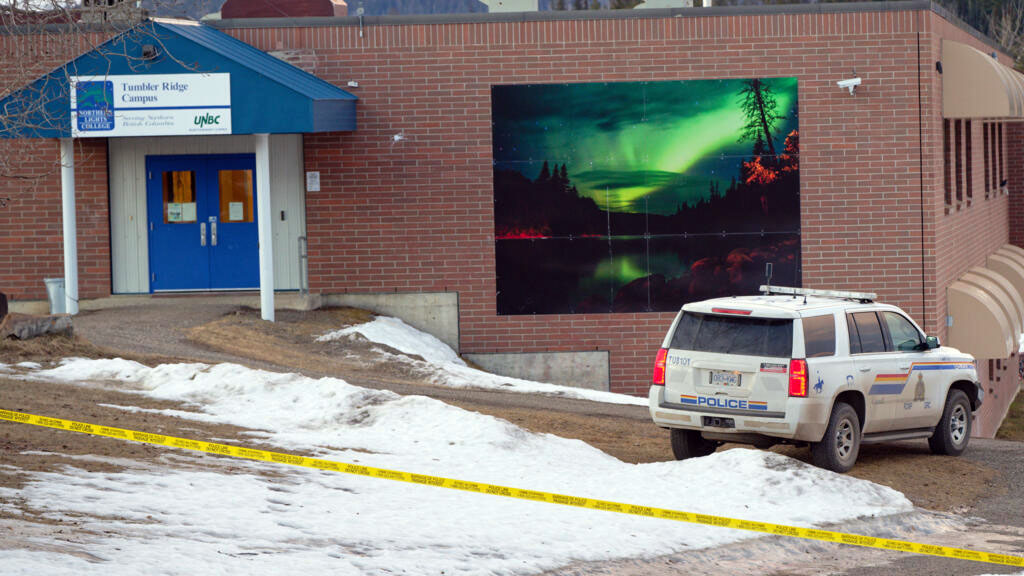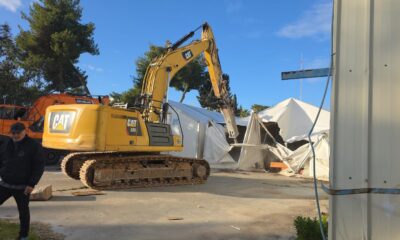International
Israel bombards Gaza, southern Lebanon ahead of October 7 anniversary

Israel bombards Gaza, southern Lebanon ahead of October 7 anniversary
DEIR AL-BALAH, Gaza Strip: A new round of airstrikes hit Beirut suburbs late Sunday as Israel intensified its bombardment of northern Gaza and southern Lebanon in a widening war with Iran-allied militant groups across the region. Palestinian officials said a strike on a mosque killed at least 19 people.
A year after Hamas’ Oct. 7 attack, Israel has opened a new front in Lebanon against Hezbollah, which has traded fire with Israel since the war in Gaza began.
Israel’s military confirmed a Hezbollah attack on the northern city of Haifa, though it was not immediately clear whether shrapnel from “fallen projectiles” was from rockets or interceptors. Hezbollah said it tried to hit a nearby naval base. The Magen David Adom ambulance service said it treated 10 people, most of them hurt by shrapnel.
Israel also has vowed to strike Iran after a ballistic missile attack on Israel last week. The widening conflict risks further drawing in the United States, which has provided crucial military and diplomatic support to Israel. Iran-allied militant groups in Syria, Iraq and Yemen have joined in with long-distance strikes on Israel.
Israel is on high alert ahead of memorial events for the Oct. 7 attack, while rallies continue around the world marking the anniversary.
Israel bombards southern Beirut
Beirut’s skyline lit up again late Sunday with new airstrikes, a day after Israel’s heaviest bombardment of the southern suburbs known as the Dahiyeh since it escalated its air campaign on Sept. 23. It was not immediately clear if there were casualties.
Israel confirmed the strikes and says it targets Hezbollah. The militant group, the strongest armed force in Lebanon, has called its months of firing rockets into Israel a show of support for the Palestinians.
A separate Israeli strike earlier Sunday in the town of Qamatiyeh southeast of Beirut killed six people, including three children, Lebanon’s Health Ministry said.
Lebanon’s state-run National News Agency reported more than 30 strikes overnight into Sunday, while Israel’s military said about 130 projectiles had crossed from Lebanon into Israeli territory.
READ ALSO:
- Bandits kill one person in Kebbi, abduct district head, others
- Russian opposition activist killed fighting for Ukraine
- Tinubu will win Kano in 2027 – Senator Barau aide
“It was very difficult. All of us in Beirut could hear everything,” resident Haytham Al-Darazi said. Another resident, Maxime Jawad, called it “a night of terror.”
One strike killed three sisters and their aunt in the coastal village of Jiyyeh. “This is a civilian home, and the biggest evidence is those martyred are four women,” said a neighbor, Ali Al Hajj.
Last week, Israel launched what it called a limited ground operation into southern Lebanon after a series of attacks killed longtime Hezbollah leader Hassan Nasrallah and most of his top commanders. The fighting is the worst since Israel and Hezbollah fought a month-long war in 2006.
At least 1,400 Lebanese, including civilians, medics and Hezbollah fighters, have been killed and 1.2 million driven from their homes. Israel says it aims to drive the militant group from its border so tens of thousands of Israeli citizens can return home.
The Israeli military is now setting up a forward operating base close to a UN peacekeeping mission on the border in southern Lebanon, a UN official told The Associated Press. The base puts peacekeepers at risk, said the official, who spoke on condition of anonymity due to the sensitivity of the situation.
UNIFIL, created to oversee the withdrawal of Israeli troops from southern Lebanon after Israel’s 1978 invasion, refused the Israeli military’s request to vacate some of its positions ahead of the ground incursion.
New evacuation orders in northern Gaza
An Israeli strike hit a mosque where displaced people sheltered near the main hospital in the central Gaza town of Deir Al-Balah. Another four were killed in a strike on a school-turned-shelter near the town. The military said both strikes targeted militants. An Associated Press journalist counted the bodies at the Al-Aqsa Martyrs Hospital morgue.
Israel’s military announced a new air and ground offensive in Jabaliya in northern Gaza, home to a refugee camp dating to the 1948 war surrounding Israel’s creation. Israel has carried out several operations there only to see militants regroup. The military said three soldiers were severely wounded in Sunday’s fighting in northern Gaza.
Israel reiterated its call for the complete evacuation of heavily destroyed northern Gaza, where up to 300,000 people are estimated to have remained.
“We are in a new phase of the war,” the military said in leaflets dropped over the area. “These areas are considered dangerous combat zones.” A later statement said three projectiles were identified crossing from northern Gaza into Israeli territory, with no injuries reported.
READ ALSO:
- Pastor slumps, dies during child dedication in Maiduguri church
- Police kill three suspects involved in attempt to kidnap Delta lawmaker’s wife
- FG presents CNG-buses to Ekiti govt, unveils conversion centres
Frantic residents fled again. “Since Oct. 7 to the present day, this is the 12th time that I and my children, eight individuals, have been homeless and thrown into the streets and do not know where to go,” said one, Samia Khader.
The Civil Defense — first responders operating under the Hamas-run government — said it recovered three bodies, including a woman and a child, after a strike hit a home in the Shati refugee camp.
Residents mourned. Imad Alarabid said on Facebook an airstrike on his Jabaliya home killed a dozen family members, including his parents. Hassan Hamd, a freelance TV journalist whose footage had aired on Al Jazeera, was killed in shelling on his home in Jabaliya. Al Jazeera reporter Anas Al-Sharif confirmed his death.
Nearly 42,000 Palestinians have been killed in Gaza since the war began, according to the Gaza Health Ministry. It does not say how many were fighters, but says a little over half were women and children.
Hamas-led militants killed some 1,200 people in the Oct. 7 attack and took another 250 hostage. They still hold around 100 captives, a third of whom are believed to be dead.
UK advises against travel while France seeks partial arms embargo on Israel
The United Kingdom on Sunday advised its citizens against non-essential travel to Israel due to the violent clashes in the Mideast. The Foreign, Commonwealth and Development Office also advised against all travel in parts of northern and southern Israel, most of the West Bank, and the Gaza Strip.
Last week the UK advised its citizens against all travel to Lebanon.
French President Emmanuel Macron on Sunday reiterated his call for a partial arms embargo on Israel, which had prompted an angry response from Israeli Prime Minister Benjamin Netanyahu.
Netanyahu had described such calls by Macron as a “disgrace.” Macron’s office insisted that “France is Israel’s unfailing friend” and called Netanyahu’s remarks “excessive.”
Later on Sunday, Netanyahu’s office said the two leaders had spoken and agreed to promote “a dialogue” on the matter. Macron’s office called the discussion “frank” and said both leaders “accepted their divergence of views.”
Israel bombards Gaza, southern Lebanon ahead of October 7 anniversary
International
Trump Halts Minnesota Immigration Crackdown After Fatal Shootings, Protests

Trump Halts Minnesota Immigration Crackdown After Fatal Shootings, Protests
The Trump administration has officially halted Operation Metro Surge, a controversial immigration enforcement operation in Minnesota, following widespread protests, political backlash, and the deaths of two U.S. citizens. The decision was announced by Tom Homan, the U.S. “border czar,” who confirmed that President Donald Trump approved ending the monthslong crackdown.
Operation Metro Surge, launched in December 2025, focused on the Minneapolis–St. Paul metropolitan area, deploying nearly 3,000 federal immigration officers at its peak. The operation aimed to detain undocumented immigrants, which the Department of Homeland Security (DHS) described as targeting “criminal illegal aliens.” However, reports indicate that many detainees had no criminal records, including children and U.S. citizens, raising concerns about the operation’s scope and fairness.
- Army University Professor Dies in Boko Haram Captivity After Nearly One Year
- MURIC Calls Proposed US Sanctions on Nigerian Muslims ‘Lopsided’
- Supreme Court Affirms Muslim Students’ Right to Worship at Rivers State University
The crackdown drew intense public opposition after anti-ICE protesters Renée Good and Alex Pretti were fatally shot during separate incidents in Minneapolis. The shootings intensified calls for accountability and prompted local and national criticism of federal enforcement tactics.
In a statement, Homan said, “I have proposed and President Trump has concurred that this surge operation conclude.” He noted that a drawdown of federal personnel had already begun, with a smaller contingent remaining temporarily to transition operations and coordinate with local authorities.
During the operation, DHS reported over 4,000 arrests, though critics highlighted the disproportionate impact on communities and families, emphasizing the humanitarian and civil liberties concerns arising from the surge.
Minnesota officials, including Governor Tim Walz and Minneapolis Mayor Jacob Frey, welcomed the decision, calling the operation an overreach that harmed communities and strained trust between law enforcement and residents. Civil rights groups also praised the halt but urged comprehensive immigration reforms to prevent future abuses.
The end of Operation Metro Surge marks a significant development in the national debate over immigration enforcement, sanctuary policies, and federal authority, highlighting the challenge of balancing border security with human rights and community safety.
Trump Halts Minnesota Immigration Crackdown After Fatal Shootings, Protests
International
Russia Escalates Digital Control with Attempted WhatsApp Block

Russia Escalates Digital Control with Attempted WhatsApp Block
WhatsApp has accused the Russian government of trying to completely block its messaging service in the country, a move aimed at steering users toward the state-backed app MAX. The Meta-owned platform said the effort, reported on February 12, 2026, threatens over 100 million users and undermines private, encrypted communication in Russia.
In a statement, WhatsApp said: “Today the Russian government attempted to fully block WhatsApp in an effort to drive people to a state-owned surveillance app. Trying to isolate over 100 million users from private and secure communication … can only lead to less safety for people in Russia. We continue to do everything we can to keep users connected.”
READ ALSO:
- Tumbler Ridge Massacre: Canada Investigates Shooter’s Mental Health, Police History
- Ex-Acting AGF Nwabuoku Admits Diverting N868.4 Million to Private Firms
- Kwankwasiyya Urges US Congress to Drop Kwankwaso’s Name from Bill
The attempt is part of a broader crackdown on foreign tech platforms in Russia. Authorities have previously restricted access to Facebook, Instagram, and targeted other services like Telegram. Reports indicate that Roskomnadzor, Russia’s communications regulator, removed WhatsApp from its national internet directory, forcing users to rely on VPNs to access the platform. Critics warn that such measures are designed to expand state surveillance and control over digital communication.
The government is actively promoting MAX, a domestic “super-app” similar to China’s WeChat, which combines messaging with other services. Rights advocates caution that the push toward MAX could compromise privacy protections that platforms like WhatsApp provide. Meanwhile, Kremlin officials have indicated that WhatsApp and other restricted apps could be restored if Meta complies with local data storage and regulatory laws.
WhatsApp’s statement emphasizes that the company will continue to work to keep its service accessible where possible, but the attempted block highlights Russia’s ongoing effort to enforce digital sovereignty and shift users toward state-controlled technology platforms.
Russia Escalates Digital Control with Attempted WhatsApp Block
International
Tumbler Ridge Massacre: Canada Investigates Shooter’s Mental Health, Police History

Tumbler Ridge Massacre: Canada Investigates Shooter’s Mental Health, Police History
Canadian authorities are intensifying investigations into the mental health history and prior police interactions of Jesse Van Rootselaar, the 18-year-old who carried out a deadly mass shooting in the remote mining town of Tumbler Ridge, British Columbia, on February 10, 2026. The tragedy has left the small community in mourning and raised national questions about gun control, mental health support, and law enforcement interventions.
According to RCMP Deputy Commissioner Dwayne McDonald, authorities are still unclear on the motive behind the attack, which is one of the deadliest school shootings in Canadian history. Van Rootselaar, a transgender woman who had dropped out of Tumbler Ridge Secondary School four years ago, first killed her mother and stepbrother before opening fire at the school, where she shot six more victims. The shooter later took her own life at the scene.
Investigators have confirmed that Van Rootselaar was known to police and had previous interactions with the public health system due to mental health concerns. Authorities are reviewing prior incidents, including earlier firearms seizures and her lapsed gun licence, to understand how warning signs were addressed before the massacre. British Columbia Premier David Eby said officials are working with the health system to determine “what interactions may have taken place” in the past.
READ ALSO:
- Ex-Acting AGF Nwabuoku Admits Diverting N868.4 Million to Private Firms
- Kwankwasiyya Urges US Congress to Drop Kwankwaso’s Name from Bill
- Liverpool Edge Sunderland 1-0 to Halt Impressive Home Streak
The victims include a 39-year-old female teacher and five students aged 12 and 13, with one child, 12-year-old Maya Gebala, in critical condition after trying to lock herself and classmates in a library during the attack. First responders arrived within minutes, but the scale of the violence left the tight-knit community of about 2,700 residents reeling. Hundreds gathered for a candlelight vigil to honour those killed and injured.
Prime Minister Mark Carney addressed parliament, describing Tumbler Ridge as a resilient, compassionate community of miners, teachers, and construction workers, and emphasised the need to learn from the tragedy. Flags across Canada have been lowered to half-staff for seven days in remembrance of the victims. Britain’s King Charles and Queen Camilla also expressed shock and sorrow over the massacre.
Schools in the area will remain closed for the remainder of the week as authorities continue their investigation into Van Rootselaar’s mental health background, police interactions, and access to firearms, seeking to understand how similar tragedies can be prevented in the future.
Tumbler Ridge Massacre: Canada Investigates Shooter’s Mental Health, Police History
-

 metro3 days ago
metro3 days agoIKEDC Sets Feb 20 Deadline for Customers to Submit Valid IDs or Face Disconnection
-

 Education3 days ago
Education3 days agoSupreme Court Affirms Muslim Students’ Right to Worship at Rivers State University
-

 metro2 days ago
metro2 days agoLagos Police Launch Manhunt for Suspect in Brutal Ajah Murder
-

 News2 days ago
News2 days agoAso Rock Goes Solar as Tinubu Orders National Grid Disconnection
-

 Business3 days ago
Business3 days agoNaira Could Trade Below ₦1,000/$ With Dangote Refinery at Full Capacity — Otedola
-

 metro3 days ago
metro3 days agoArmy University Professor Dies in Boko Haram Captivity After Nearly One Year
-

 International3 days ago
International3 days agoTrump Halts Minnesota Immigration Crackdown After Fatal Shootings, Protests
-

 Sports2 days ago
Sports2 days agoLookman Shines as Atlético Madrid Hammer Barcelona 4-0















